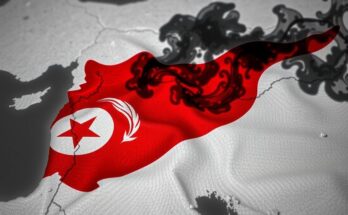Lebanon’s caretaker Prime Minister Najib Mikati criticized Iran for interference in Lebanese affairs following remarks by Iranian Parliament Speaker Mohammad Baqer Ghalibaf, who suggested Iran’s readiness to negotiate terms for a cease-fire in Lebanon. Mikati summoned the Iranian envoy, marking a rare diplomatic dispute given Hezbollah’s significant influence in the country.
On Friday, Najib Mikati, the caretaker Prime Minister of Lebanon, issued a rare and pointed rebuke towards Iran, accusing the nation of unwarranted interference in Lebanese domestic matters. This diplomatic conflict emerged following remarks made by Mohammad Baqer Ghalibaf, the Speaker of Iran’s Parliament, who stated that Iran was prepared to assist in negotiations concerning the implementation of U.N. Security Council Resolution 1701. This resolution facilitated the cessation of hostilities between Hezbollah and Israel in 2006 and is perceived as a preliminary condition for establishing a cease-fire in Lebanon. Mr. Mikati characterized Ghalibaf’s comments as “blatant interference in Lebanese affairs,” highlighting the sensitivity surrounding Iranian influence in Lebanon, particularly given Hezbollah’s significant role within the country’s political landscape. In response to these developments, Mikati summoned the Iranian ambassador to Lebanon, a move that underscores the gravity of the situation and marks an unusual diplomatic action against a country that wields considerable power through its alliance with Hezbollah.
The relationship between Lebanon and Iran has been historically intricate, particularly due to Iran’s backing of the Shiite militant group Hezbollah, which has considerable influence over Lebanese politics. The country’s delicate political balance is often challenged by external entities, and Iran’s activities in the region frequently come under scrutiny as they relate to local sovereignty. The recent comments by Iranian officials regarding negotiations related to cease-fire conditions highlight the ongoing tensions and the potential ramifications of foreign intervention in national affairs.
This development signifies a pivotal moment in Lebanese-Iranian relations, with Lebanon asserting its sovereignty in the face of foreign influence. Najib Mikati’s public condemnation of Iranian interference reflects broader concerns over the country’s political autonomy and regional stability. As Lebanon navigates this diplomatic challenge, it remains crucial to observe how these interactions may affect both domestic dynamics and Lebanon’s standing within the international community.
Original Source: www.nytimes.com




